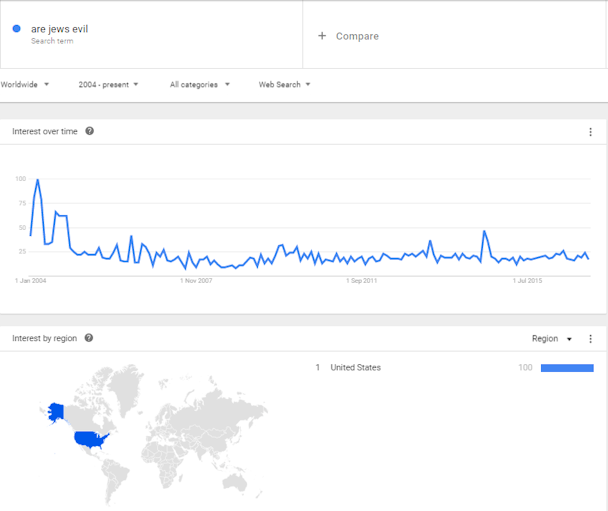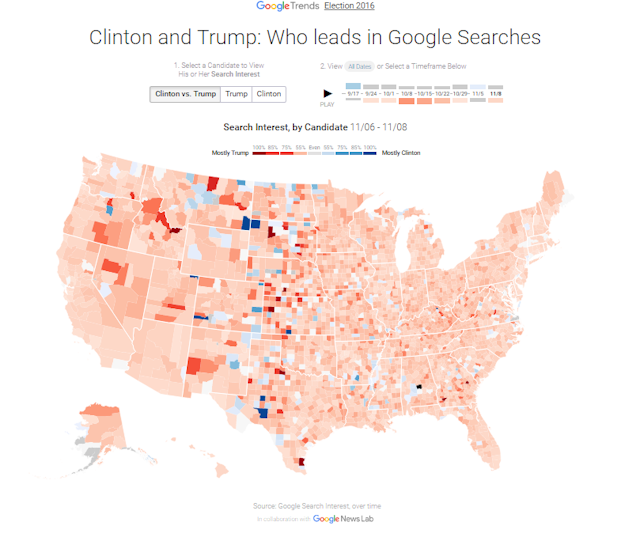Evil SERPs are not proof of Google’s failure, but mainstream media’s search marketing illiteracy
Writing in the Observer on Sunday 4th December, Carole Cadwalladr began a lengthy essay on the supposed failings of the Google algorithm. She typed the beginning of a query ‘are jews’, she says, and was faced with auto-complete suggestions including ‘are jews evil’, ‘are jews white’ ‘are jews a race’ and more unpalatable offerings to help cater to her possible intent.

Do the mainstream media understand the way SERPs work?
While I, like Danny Sullivan of SearchEngineLand, “thought they stopped offering autocomplete suggestions for religions in 2011”, what the article and referred to SERPs showed gave me chills for an altogether different reason.
When I read the piece, my first instinct was of course to fact check. I saw the same SERPs filled with anti-Semitic bile. However, while Cadwalladr saw Google failing to filter unsavoury results, I saw a failure of the media to understand search marketing.

While auto-suggest for the ‘are jews’ search term has been amended since Sunday, today’s SERPs clearly show how fundamental the failings of the media, rather than Google, have been.

SERPs for the key term still feature four results which are anti-Semitic, but the other six positions are filled by high DA sites discussing the original Observer piece (with follow-ups likely to occupy all ten as new articles are crawled).
The reason for this sudden influx? The articles posted in the last few days are fresh content and keyword focused. This and the high DAs of the media outlets posting them, resulted in the unseating of the articles they criticise. Provided they can accrue enough links, which theguardian.com is doing, as you would expect, these articles will remain.

Guardian article referencing original Observer piece has 41 referring domains with 987 referring pages in just two days.

Listovative article has 41 referring domains with 387 referring pages since posted.
Google (the multinational, multibillion dollar corporation), does not need my defence. What drives me to respond is that both the SERPs referred to, as well as the Observer article, demonstrate a fundamental digital failing. Quite simply, the left (me included) assumed certain battles had been won – and stopped fighting them.
This has resulted in the shut-down of conversations perpetually referenced by Brexit’s proponents and Trump’s campaign (on immigration, on race etc.), leaving searchers to find sites like ‘biblebelievers.com’ functioning online without competition.

Map showing Trumps success in search.
In fact, if we check Google’s data, we can see that searches for the ‘are jews evil’ search term reached a nadir around November 2007, remaining, generally, at fewer than 20 percent of peak searches per month since (an average of, while troubling, not alarming, 880 searches per month according to Google Keyword Planner).

A similar decline can be seen in the ‘are muslims evil’ search term – though it appears to be trending disconcertingly upward (though presently at only 210 searches per month on average).

Google’s algorithm is not immoral, it is amoral; its job is to return the best answers to search queries – a job it does well or it goes broke. SERPs we find distasteful do not exist because of Google, nor should it be its responsibility to fix them.
The media needs to tackle this phenomenon – and to do that it needs to overcome the idea that the Google algorithm is an unknowable, mystical entity.
While we have no direct access to the algorithm, The Drum’s digital census placed UK fee income from search marketing at close to a billion pounds. There are thousands of people throughout the country whose job it is to infer the inner workings of the algorithm from results.
What is required to stop such warped SERPs is not a campaign against Google, but one of engagement with key terms. While news sites have an obligation to be current, in the digital era, they are also resources.
By targeting terms they may find distasteful, high DA, well regarded sites would have no difficulty ensuring they are the first port of call for those searching for such terms. However, it requires blogs written on ‘evergreen’ topics, for long-term traffic, and for consumer personas outside of their usual demographic; it will require thorough keyword research, article optimisation and a much improved knowledge of search.
I agree, to some extent, with Cadwalladr’s conclusion that:
This is our internet. Not Google’s. Not Facebook’s. Not rightwing propagandists. And we’re the only ones who can reclaim it.
However, it is not from Google it must be reclaimed, but complacency. In fact, Google’s rankings signals mean that outlets such as the theguardian.com have DA ratings that would make challenging for such terms child’s play for any agency worth its salt.
Our industry needs to communicate better, but as traditional news platforms struggle for revenue, some seeking to imitate the success of Buzzfeed’s listicles for example, it would benefit them to understand new media platform’s successes, and the techniques they are using.
(Just for balance, here’s the rich answer and top three results for the term ‘are Google evil’):

I’m sure that, were the question ‘should we allow a corporation to censor search results’, the answer would be a firm no. But who, then becomes the arbiter of truth? Only an endeavour to make sensitive topics a conversation can establish an accurate depiction of issues in SERPs.
Content by The Drum Network member:

Click Consult (Part of Ceuta Group)
Located in North West England, Click Consult is a multi award-winning digital and search marketing agency with a focus on organic (SEO) and paid search (PPC). Part...
Find out more
